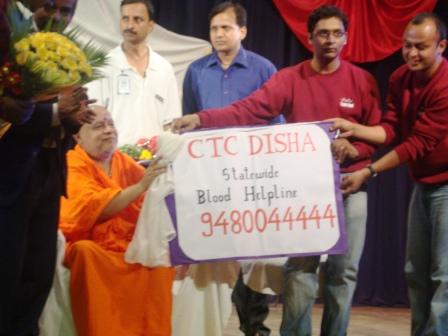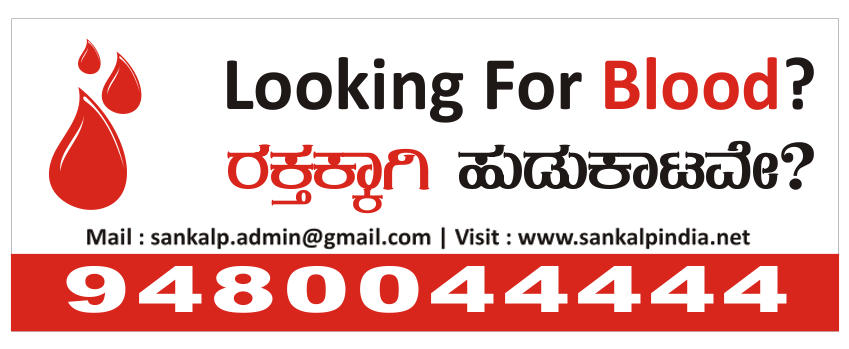 In 2006, Karnataka became the first state in India to have a single point of contact for blood information access. The safest blood banks of the state were embraced the idea of transparency and were networked to a single channel. Today any person searching for blood needs to dial just a single number 9480044444 to find out the closest place where safe blood is available. "We have huge requirement and a good part of it gets catered to by Sankalp. Through camps or through the helpline, Sankalp's work in taking blood donation forward is praiseworthy." says Dr Dheemantha of Victoria Blood Bank, Bangalore.
In 2006, Karnataka became the first state in India to have a single point of contact for blood information access. The safest blood banks of the state were embraced the idea of transparency and were networked to a single channel. Today any person searching for blood needs to dial just a single number 9480044444 to find out the closest place where safe blood is available. "We have huge requirement and a good part of it gets catered to by Sankalp. Through camps or through the helpline, Sankalp's work in taking blood donation forward is praiseworthy." says Dr Dheemantha of Victoria Blood Bank, Bangalore.
The Beginning
It was 23rd May 2006, the third anniversary of Sankalp India Foundation. Amidst the heavy introspection and brainstorming among volunteers, it was realized that most blood requests get resolved just by calling the blood banks. Not every-time a blood donation is needed. There were over 50 blood banks operational in Bangalore. Calling each of them was difficult for the patient. Visiting each of them was at-least a weeks affair. Leaving patients on themselves to search of the safest blood banks and seek availability did not seem to be the best way.
An idea emerged. What if the blood bank stocks are known? What if patients need to call just a single number and they are provided with the right information? Sankalp volunteers went and discussed the idea with the blood bankers and transfusion medicine experts of Bangalore. Some laughed. Others believed in the idea. Newer ideas emerged. On 13th September 2006, Project Disha was born. 5 blood banks were integrated to a single number - 1062. The helpline was inaugurated by the hon. Governor of Karnataka Shri T N Chaturvedi. It was the combined helpline for Ambulance and blood, and was managed by Comprehensive Trauma Consortium (CTC), a fellow NGO. The project was called CTC Disha. "Ours was among the first blood banks to join the helpline. Most of the helpline front tasks are handled by our technicians, while I participate in the quality and safety assurance. Thanks to our staff, we get a lot of camps through out the year. Still, whenever we face a situation with a certain group not being available, we look up to the the blood helpline." says Dr Atashi Sinha, Blood Bank officer of Lions Blood Bank Bangalore.
History
The helpline was in place, but what about awareness? Blood banks were being called daily. Their blood stocks availability details being updated in sheets. But what about the patients who were not aware of the number? In a city where every 2 minutes someone needs blood, having 6 calls per week on the helpline was depressing. In order to bring the helpline into notice, Sankalp conducted the 'Walk for Life'. On 11th November 2006, 40 students walked a distance of 42 Kms for 15 hrs, encircling Bangalore, with just one Message - "Need Blood Call Us".
A sudden surge in the number of incoming calls was witnessed. However, it soon dipped down after the media hype was over. Newer methods for spreading awareness of the helpline were explored. Helpline stickers were stuck up in hundreds of BMTC buses in the city. Media was aggressively approached. The quality of service the helpline offered spoke for itself. Through word of mouth, and with more and more blood banks and doctors trusting the helpline, calls were on the rise.
 By 2009, the helpline had established itself as the solution for blood in Bangalore. 17 blood banks of Bangalore were participating in a unique life saving network. Call volumes was decently high for Bangalore. This was about time when the helpline was to be expanded to the entire state. On 15th August, 2009, Sri Balgangadharanatha Swamiji of Adichunchungiri Ashram dedicated the helpline to the State of Karnataka. Since 1062 was a local Bangalore number, a new number was started - 9480044444.
By 2009, the helpline had established itself as the solution for blood in Bangalore. 17 blood banks of Bangalore were participating in a unique life saving network. Call volumes was decently high for Bangalore. This was about time when the helpline was to be expanded to the entire state. On 15th August, 2009, Sri Balgangadharanatha Swamiji of Adichunchungiri Ashram dedicated the helpline to the State of Karnataka. Since 1062 was a local Bangalore number, a new number was started - 9480044444.
The next two years witnessed heavy networking campaigns across the state. By 2011, 57 blood banks - from 23 districts - accounting for 95% of the blood requirement of the state - were integrated into the helpline. All these blood banks were visited by volunteers personally, and only after being assured of their safety and quality, were invited to be a part of the network. "Sankalp is doing good work in making blood more available to blood banks as well as the patients. We update our stocks with Sankalp daily. A good number of blood requests come to our blood bank through the helpline. We, however, need to fight the blood shortage which we face during summers and hence equal distribution of camps is important. Since we are a hospital based blood bank, we have to rely on replacement during shortage times. However when we have adequate stocks, we never ask for replacement. We even give blood to other blood banks during such times." says Dr.Rajalakshmi, the Blood Bank Chief of JSS Hospital Blood Bank , Mysore, as she congratulates Disha for it's completion of 7 years.
When in need of blood, the patient is in the hospital. What better a place than the hospitals, to make the new helpline gain visibility? Within 2010 and 2011, over 600 hospitals across the state were visited. Doctors and patients were spoken to, and helpline stickers and posters were put up in reception, emergency wards, blood banks, labs, near telephone booths and other areas within the hospital premises. Stickers were sent to another 400 hospitals to the remote areas of Karnataka, requesting the hospital in-charge requesting their help in this regard, which went a long way in ensuring supply of safe blood to the needy on time.
Technology Enhancements
 "The tecnhical curve of Project Disha has been equally enthralling", says Amit Sedai, a tech team volunteer of Sankalp. "Once managed in sheets of paper, then in excel sheets, then the centralized information management system - the backup technology behind the helpline has come a long way. The Disha Information Management system was started on 1st June 2011. From an equipment backing it completely, to on and off sms backup facilities, the tech support to Disha has only helped things improve. As of date, there is a full fledged mechanism in place", he adds. The Disha Information Management System enables Blood stocks updation in a centralized as well as distributed manner.
"The tecnhical curve of Project Disha has been equally enthralling", says Amit Sedai, a tech team volunteer of Sankalp. "Once managed in sheets of paper, then in excel sheets, then the centralized information management system - the backup technology behind the helpline has come a long way. The Disha Information Management system was started on 1st June 2011. From an equipment backing it completely, to on and off sms backup facilities, the tech support to Disha has only helped things improve. As of date, there is a full fledged mechanism in place", he adds. The Disha Information Management System enables Blood stocks updation in a centralized as well as distributed manner.
In a single click, blood bank and stock availability for across locations can be accessed. Many Blood banks with internet and adequate staff update their own stocks in the system, and the underlying technology facilitates that. "My work as the call center executive of Sankalp is to handle blood request calls, donor requests, volunteering requests etc. I enjoy my work and I feel happy for myself. The software I work on, makes my work simple and effective. I am happy with my work, helping those who are in very critical stage. I am getting good support from volunteers to learn and develop more and more", says Jyothi Crasta, the Response Center Executive, working for Project Disha. The system also has a SMS gateway feature to send information to the callers in form of SMS. The feature is yet to be brought to full usage.
Additionaly, the underlying technology also enables quality check features for the calls to gather feedback from the patients who availed the helpline service. "This helps us to bring progressiveness in the work we do, helps improve the helpline service." says Lalith Parmar, President of Sankalp India Foundation. "The person was in ICU in critical position. You did a great job by saving the life. Thank you very much." one of the the blood recipients was quoted saying. The Disha Information Management System also generates interactive reports to check the health of all the processes. "From the rise and fall in the blood stocks of the state, to the holes that grow within the stocks taking process, to the blood banks and areas from where we get calls, we can see all of it in one place" says Lalith.
Salient features
The following are the strengths which make project Disha and the helpline so unique and powerful -
- Disha is a 100% impartial service which does not have affiliations with any blood banks. It works purely on the need basis and treats all blood banks equally
- Multi Lingual Support at the call centre
- Blood Stocks infortmation updated every 24 hours
- All the blood banks attached to the helpline are known for quality and safety
- The helpline is networked with almost every important blood bank in the Karnataka
- Presently the helpline receives more than 1000 blood requests every month
- The service provided is completely free
- The Response Centre Executives who handle the helpline are equipped to handle various types of blood requests
- Disha undertakes massive publicity programmes to popularise the helpline. Driven by youth and directed to the locations where most people are likely to start their blood search, this campaign ensues that the needy get to know about the helpline
- Disha has a dedicated team of volunteers to fix the problems that creep into the system
- By coordinating with other teams in Sankalp, Disha is able to ensure help to each of the caller
- If Disha is unable to cater to a blood request, the 24 x 7 active emergency wing of Sankalp caters to it
Celebrating 7 years
On 13th September 2013, Project Disha completed 7 years. The project has come a long way from being a new concept to an accepted norm across the country. The goal is still far, but atleast the initial few steps are strong, and have been taken in the right direction. The system is building up from the very bottom - with uncompormised focus towards the needy. The wheels - of change - are turning.
